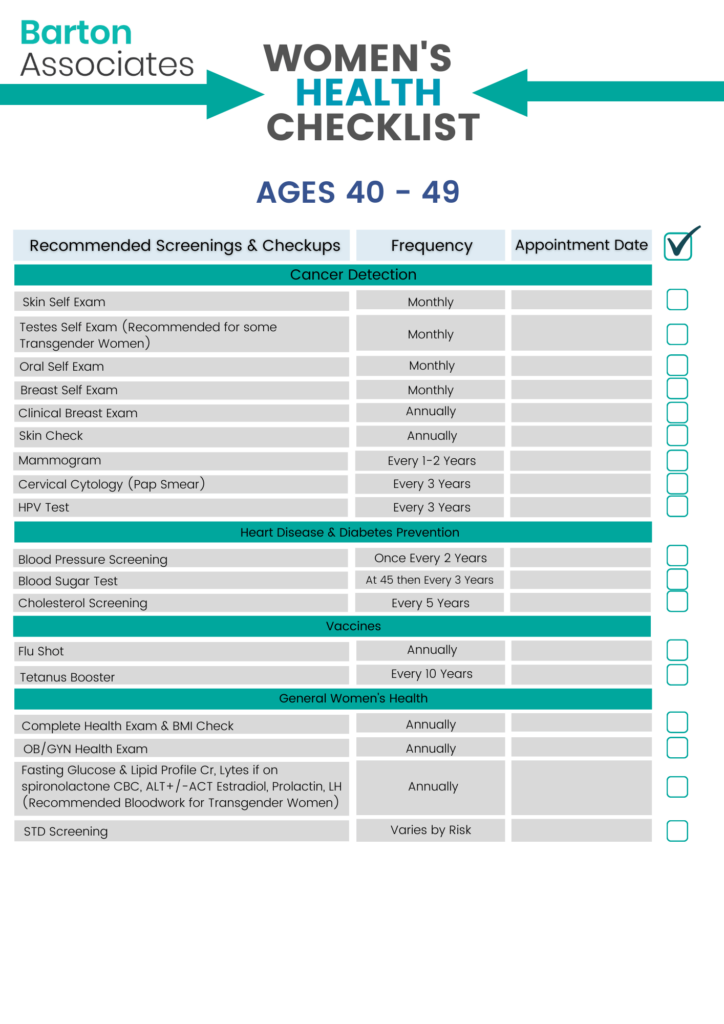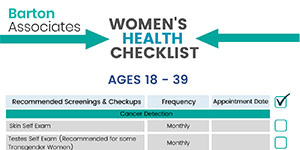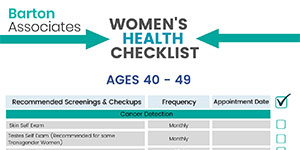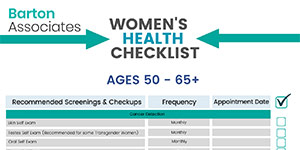Complete Women's Health Checklist for Women Aged 40-49

PRIORITIZING WOMEN’S HEALTH FOR LONGER, HEALTHIER LIVING
Between the ages of 40-49, women generally have a lot to focus on as it is. Whether they are busy building their careers, their families, or both at the same time, it can be easy for women to forget about practicing self care. We’re not talking about the beauty industry self care standard of putting on a moisturizing face mask or buying a bath bomb, we mean really putting yourself first by taking care of your health.
Women show their resilience by making it seem easy to balance it all, and when their health becomes a priority, women can only grow stronger.
Our Complete Women’s Health Checklist for women aged 40 to 49 compiles all of the tests, screenings, exams, and vaccines you need to organize your appointments by breaking them up into easy-to-understand categories by purpose and frequency.
Click Now to Download Your Complete Women’s Health Checklist for Ages 18-39!

While you’re equipped to simply sit down and get to calling your doctor to schedule checkups and tests, it’s definitely helpful to know what exactly you’ve just scheduled, and why it’s important you get it done! Read on for some further information about the recommended screenings, checkups, and vaccines you can find in our Women’s Health Checklist for Women Aged 40-49.
- Complete Health Exam
An assessment of overall health utilizing tests which are often ordered during your annual wellness visit in order to evaluate health concerns common among men. - Clinical Breast Exam
A physical examination of the breasts performed by a physician to check for any lumps or changes to detect breast cancer. - Skin Check
A head to toe skin examination and discussion of your concerns and medical history with a physician done either as a part of your routine annual check up, or with a dermatologist. - BMI Check
A calculation of a person’s body fat percentage using height and weight used to screen for risk factors that may lead to health problems. - Cervical Cytology
Also called a Pap test or Pap smear, a cervical cytology is the study of cells taken from the cervix using a microscope to detect changes in the cells of the cervix that could lead to cancer. - Mammogram
X-ray imaging of the breasts done by pressing each breast between two plastic plates and taking an x-ray photo to detect early signs of breast cancer. - HPV Test
A physician checks for high risk HPV types by collecting and testing a sample of cells from the cervix which is collected using a small spatula, brush, or swab. - Blood Pressure Screening
A measurement of the pressure in your arteries as your heart pumps which is done by placing a stethoscope over the major artery in your upper arm to listen to blood flow while an arm cuff is inflated with air. - Blood Sugar Test
A blood test which measures the level of glucose (sugar) in your blood to screen for diabetes. - Cholesterol Screening
A blood test which measures your levels of low-density lipoprotein (LDL), or “bad” cholesterol, high density lipoprotein (HDL), or good cholesterol, triglycerides, a type of fat which your body uses for energy, and total cholesterol, the total amount of cholesterol in your blood. - Flu Shot
An annual vaccination that prevents the influenza virus. - Tetanus Booster
A vaccination that prevents against tetanus, an infection caused by Clostridium tetani bacteria. - OB/GYN Health Exam
An assessment with your OB/GYN healthcare provider which includes a pelvic exam, a Pap smear, a breast exam, and an assessment of your overall health status. - Fasting glucose and lipid profile CBC, ALT/-AST, Free+Total Testosterone (Recommended for transgender women)
Fasting glucose and lipid profile: A blood test including measurements for cholesterol and a measurement of your fasting blood sugar level. - ALT/-AST: A Blood test which measures different types of liver enzymes to detect liver damage.
- Free+Total Testosterone: A blood test that measures the levels of free testosterone (testosterone that is not attached to a protein) and total testosterone (includes both free testosterone and testosterone attached to a protein) in your blood used to diagnose various conditions.
- STD Screening
A blood test used to find out if you have been infected with a sexually transmitted disease.
To learn more about self exams, check out the following resources:
Oral Self Exam Guidelines
Skin Self Exam Guidelines
Breast Self Exam Guidelines


